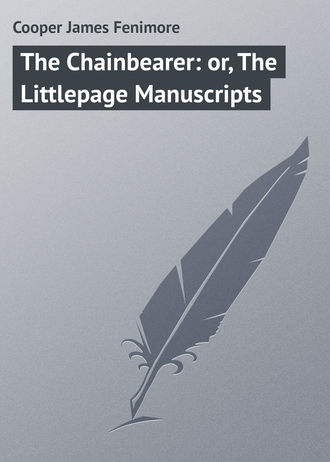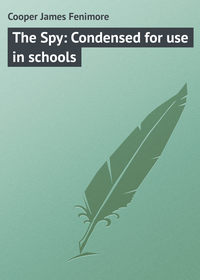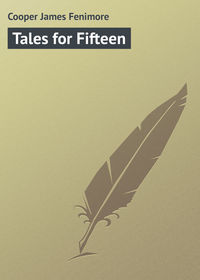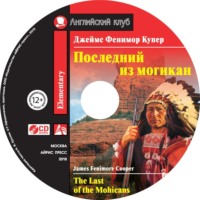 полная версия
полная версияThe Chainbearer: or, The Littlepage Manuscripts
"Forsaken! Dus – Ursula – Miss Malbone forsaken! That could never happen, Andries, Frank or no Frank."
"I hope not – I hope not, lat – put t'e gal pegins to weep, and we'll talk no more apout it. Harkee, Susquesus; my olt frient, can you guite us to t'is roost?"
"Why no do it, eh? Path wide – open whole way. Plain as river."
"Well, t'en, we wilt all pe off for t'e place in t'e morning. My new assistant is near, and it is high time Frank and I hat gone into t'e woots ag'in."
I heard this arrangement made, though my eyes were following Dus, who had started from her seat, and rushed into the house, endeavoring to hide emotions that were not to be hushed. A minute later I saw her at the window of her own room, smiling, though the cloud had not yet entirely dispersed.
Next morning early our whole party left the 'Nest for the hut at Mooseride, and the pigeon-roosts. Dus and the black female servant travelled on horseback, there being no want of cattle at the 'Nest, where, as I now learned, my grandfather had left a quarter of a century before, among a variety of other articles, several side-saddles. The rest of us proceeded on foot, though we had no less than three sumpter beasts to carry our food, instruments, clothes, etc. Each man was armed, almost as a matter of course in that day, though I carried a double-barrelled fowling-piece, instead of a rifle. Susquesus acted as our guide.
We were quite an hour before we reached the limits of the settled farms on my own property; after which, we entered the virgin forest. In consequence of the late war, which had brought everything like the settlement of the country to a dead stand, a new district had then little of the straggling, suburb-like clearings, which are apt now to encircle the older portions of a region that is in the state of transition. On the contrary, the last well-fenced and reasonably well-cultivated farm passed, we plunged into the boundless woods, and took a complete leave of nearly every vestige of civilized life, as one enters the fields on quitting a town in France. There was a path, it is true, following the line of blazed trees; but it was scarcely beaten, and was almost as illegible as a bad hand. Still, one accustomed to the forest had little difficulty in following it; and Susquesus would have had none in finding his way, had there been no path at all. As for the Chainbearer, he moved forward too, with the utmost precision and confidence, the habit of running straight lines amid trees having given his eye an accuracy that almost equalled the species of instinct that was manifested by the Trackless himself, on such subjects.
This was a pleasant little journey, the depths of the forest rendering the heats of the season as agreeable as was possible. We were four hours in reaching the foot of the little mountain on which the birds had built their nests, where we halted to take some refreshments.
Little time is lost at meals in the forest, and we were soon ready to ascend the hill. The horses were left with the blacks, Dus accompanying us on foot. As we left the spring where we had halted, I offered her an arm to aid in the ascent; but she declined it, apparently much amused that it should have been offered.
"What I, a chainbearess!" she cried, laughing – "I, who have fairly wearied out Frank, and even made my uncle feel tired, though he would never own it – I accept an arm to help me up a hill! You forget, Major Littlepage, that the first ten years of my life were passed in a forest, and that a year's practice has brought back all my old habits, and made me a girl of the woods again."
"I scarce know what to make of you, for you seem fitted for any situation in which you may happen to be thrown." I answered, profiting by the circumstance that we were out of the hearing of our companions, who had all moved ahead, to utter more than I otherwise might venture to say – "at one time I fancy you the daughter of one of my own tenants, at another, the heiress of some ancient patroon."
Dus laughed again; then she blushed; and for the remainder of the short ascent, she remained silent. Short the ascent was, and we were soon on the summit of the hill. So far from needing my assistance, Dus actually left me behind, exerting herself in a way that brought her up at the side of the Trackless, who led our van. Whether this was done in order to prove how completely she was a forest girl, or whether my words had aroused those feelings that are apt to render a female impulsive, is more than I can say even now; though I suspected at the time that the latter sensations had quite as much to do with this extraordinary activity as the former. I was not far behind, however, and when our party came fairly upon the roost, the Trackless, Dus, and myself were all close together.
I scarce know how to describe that remarkable scene. As we drew near to the summit of the hill, pigeons began to be seen fluttering among the branches over our heads, as individuals are met along the roads that lead into the suburbs of a large town. We had probably seen a thousand birds glancing around among the trees, before we came in view of the roost itself. The numbers increased as we drew nearer, and presently the forest was alive with them. The fluttering was incessant, and often startling as we passed ahead, our march producing a movement in the living crowd that really became confounding. Every tree was literally covered with nests, many having at least a thousand of these frail tenements on their branches, and shaded by the leaves. They often touched each other, a wonderful degree of order prevailing among the hundreds of thousands of families that were here assembled. The place had the odor of a fowl-house, and squabs just fledged sufficiently to trust themselves in short flights, were fluttering around us in all directions in tens of thousands. To these were to be added the parents of the young race endeavoring to protect them, and guide them in a way to escape harm. Although the birds rose as we approached, and the woods just around us seemed fairly alive with pigeons, our presence produced no general commotion; every one of the feathered throng appearing to be so much occupied with its own concerns, as to take little heed of the visit of a party of strangers, though of a race usually so formidable to their own. The masses moved before us precisely as a crowd of human beings yields to a pressure or a danger on any given point; the vacuum created by its passage filling in its rear, as the water of the ocean flows into the track of the keel.
The effect on most of us was confounding, and I can only compare the sensation produced on myself by the extraordinary tumult to that a man experiences at finding himself suddenly placed in the midst of an excited throng of human beings. The unnatural disregard of our persons manifested by the birds greatly heightened the effect, and caused me to feel as if some unearthly influence reigned in the place. It was strange, indeed, to be in a mob of the feathered race that scarce exhibited a consciousness of one's presence. The pigeons seemed a world of themselves, and too much occupied with their own concerns to take heed of matters that lay beyond them.
Not one of our party spoke for several minutes. Astonishment seemed to hold us all tongue-tied, and we moved slowly forward into the fluttering throng, silent, absorbed, and full of admiration of the works of the Creator. It was not easy to hear each others' voices when we did speak, the incessant fluttering of wings filling the air. Nor were the birds silent in other respects. The pigeon is not a noisy creature, but a million crowded together on the summit of one hill, occupying a space of less than a mile square, did not leave the forest in its ordinary impressive stillness. As we advanced, I offered my arm, almost unconsciously, again to Dus, and she took it with the same abstracted manner as that in which it had been held forth for her acceptance. In this relation to each other we continued to follow the grave-looking Onondago as he moved, still deeper and deeper, into the midst of the fluttering tumult.
At this instant there occurred an interruption that, I am ready enough to confess, caused the blood to rush toward my own heart in a flood. As for Dus, she clung to me, as woman will cling to man, when he possesses her confidence, and she feels that she is insufficient for her own support. Both hands were on my arm, and I felt that, unconsciously, her form was pressing closer to mine, in a manner she would have carefully avoided in a moment of perfect self-possession. Nevertheless, I cannot say that Dus was afraid. Her color was heightened, her charming eyes were filled with a wonder that was not unmixed with curiosity, but her air was spirited in spite of a scene that might try the nerves of the boldest man. Sureflint and Chainbearer were alone totally unmoved; for they had been at pigeons' roosts before, and knew what to expect. To them the wonders of the woods were no longer novel. Each stood leaning on his rifle and smiling at our evident astonishment. I am wrong; the Indian did not even smile: for that would have been an unusual indication of feeling for him to manifest; but he did betray a sort of covert consciousness that the scene must be astounding to us. But I will endeavor to explain what it was that so largely increased the first effect of our visit.
While standing wondering at the extraordinary scene around us, a noise was heard rising above that of the incessant fluttering, which I can only liken to that of the trampling of thousands of horses on a beaten road. This noise at first sounded distant, but it increased rapidly in proximity and power, until it came rolling in upon us, among the tree-tops, like a crash of thunder. The air was suddenly darkened, and the place where we stood as sombre as a dusky twilight. At the same instant, all the pigeons near us, that had been on their nests, appeared to fall out of them, and the space immediately above our heads was at once filled with birds. Chaos itself could hardly have represented greater confusion, or a greater uproar. As for the birds, they now seemed to disregard our presence entirely; possibly they could not see us on account of their own numbers; for they fluttered in between Dus and myself, hitting us with their wings, and at times appearing as if about to bury us in avalanches of pigeons. Each of us caught one at least in our hands, while Chainbearer and the Indian took them in some numbers, letting one prisoner go as another was taken. In a word, we seemed to be in a world of pigeons. This part of the scene may have lasted a minute, when the space around us was suddenly cleared, the birds glancing upward among the branches of the trees, disappearing among the foliage. All this was the effect produced by the return of the female birds, which had been off at a distance, some twenty miles at least, to feed on beechnuts, and which now assumed the places of the males on the nests; the latter taking a flight to get their meal in their turn.
I have since had the curiosity to make a sort of an estimate of the number of the birds that must have come in upon the roost, in that, to us, memorable minute. Such a calculation, as a matter of course, must be very vague, though one may get certain principles by estimating the size of a flock by the known rapidity of the flight, and other similar means; and I remember that Frank Malbone and myself supposed that a million of birds must have come in on that return, and as many departed! As the pigeon is a very voracious bird, the question is apt to present itself, where food is obtained for so many mouths; but, when we remember the vast extent of the American forests, this difficulty is at once met. Admitting that the colony we visited contained many millions of birds, and, counting old and young, I have no doubt it did, there was probably a fruit-bearing tree for each, within an hour's flight from that very spot!
Such is the scale on which nature labors in the wilderness! I have seen insects fluttering in the air at particular seasons, and at particular places, until they formed little clouds; a sight every one must have witnessed on many occasions; and as those insects appear, on their diminished scale, so did the pigeons appear to us at the roost of Mooseridge. We passed an hour in the town of birds, finding our tongues and our other faculties, as we became accustomed to our situation. In a short time, even Dus grew as composed as at all comported with the excitement natural to one in such a place; and we studied the habits of the pretty animals with a zest that I found so much the greater for studying them in her company. At the end of the hour we left the hill, our departure producing no more sensation in that countless tribe of pigeons than our arrival.
"It is a proof that numbers can change our natures," said Dus, as we descended the little mountain. "Here have we been almost in contact with pigeons which would not have suffered us to come within a hundred feet of them, had they been in ordinary flocks, or as single birds. Is it that numbers give them courage?"
"Confidence, rather. It is just so with men; who will exhibit an indifference in crowds that they rarely possess when alone. The sights, interruptions, and even dangers that will draw all our attention when with a few, often seem indifferent to us when in the tumult of a throng of fellow-creatures."
"What is meant by a panic in an army, then?"
"It is following the same law, making man subject to the impulses of those around him. If the impulse be onward, onward we go; if for retreat, we run like sheep. If occupied with ourselves as a body, we disregard trifling interruptions, as these pigeons have just done in our own case. Large bodies of animals, whether human or not, seem to become subject to certain general laws that increase the power of the whole over the acts and feelings of any one or any few of their number."
"According to that rule, our new republican form of government ought to be a very strong one; though I have heard many express their fears it will be no government at all."
"Unless a miracle be wrought in our behalf, it will be the strongest government in the world for certain purposes, and the weakest for others. It professes a principle of self-preservation that is not enjoyed by other systems, since the people must revolt against themselves to overturn it; but, on the other hand, it will want the active living principle of steady, consistent justice, since there will be no independent power whose duty and whose interest it will be to see it administered. The wisest man I ever knew has prophesied to me that this is the point on which our system will break down; rendering the character, the person, and the property of the citizen insecure, and consequently the institutions odious to those who once have loved them."
"I trust there is no danger of that!" said Dus, quickly.
"There is danger from everything that man controls. We have those among us who preach the possible perfection of the human race, maintaining the gross delusion that men are what they are known to be, merely because they have been ill-governed; and a more dangerous theory, in my poor judgment, cannot be broached."
"You think, then, that the theory is false?"
"Beyond a question; governments are oftener spoiled by men, than men by governments; though the last certainly have a marked influence on character. The best government of which we know anything is that of the universe; and it is so, merely because it proceeds from a single will, that will being without blemish."
"Your despotic governments are said to be the very worst in the world."
"They are good or bad as they happen to be administered. The necessity of maintaining such governments by force renders them often oppressive; but a government of numbers may become more despotic than that of an individual; since the people will, in some mode or other, always sustain the oppressed as against the despot, but rarely, or never, as against themselves. You saw that those pigeons lost their instinct, under the impulse given them by numbers. God forever protect me against the tyranny of numbers."
"But everybody says our system is admirable, and the best in the world; and even a despot's government is the government of a man."
"It is one of the effects of numbers that men shrink from speaking the truth, when they find themselves opposed to large majorities. As respects self-rule, the colonies were ever freer than the mother country; and we are, as yet, merely pursuing our ancient practices, substituting allegiance to the confederation for allegiance to the king. The difference is not sufficiently material to produce early changes. We are to wait until that which there is of new principles in our present system shall have time to work radical changes, when we shall begin to ascertain how much better we really are than our neighbors."13
Dus and I continued to converse on this subject until she got again into the saddle. I was delighted with her good sense and intelligence, which were made apparent more in the pertinacity of her questions than by any positive knowledge she had on such subjects, which usually have very few attractions for young women. Nevertheless, Dus had an activity of mind and a readiness of perception that supplied many of the deficiencies of education on these points; and I do not remember to have ever been engaged in a political discussion from which I derived so much satisfaction. I must own, however, it is possible that the golden hair flying about a face that was just as ruddy as comported with the delicacy of the sex, the rich mouth, the brilliant teeth, and the spirited and yet tender blue eyes, may have increased a wisdom that I found so remarkable.
CHAPTER XV
"Fie, fie, fond love, thou art so full of fear,As one with treasure laden, hemmed with thieves,Trifles, unwitnessed with eye or ear,Thy coward heart with false bethinking grieves."– Venus and Adonis.The hut, or huts of Chainbearer, had far more comfort in and around them, than I was prepared to find. They were three in number, one having been erected as a kitchen, and a place to contain the male slaves; another for the special accommodation of Ursula and the female black; and the third to receive men. The eating-room was attached to the kitchen; and all these buildings, which had now stood the entire year, were constructed of logs, and were covered with bark. They were roughly made, as usual; but that appropriated to Dus was so much superior to the others in its arrangements, internal and external, as at once to denote the presence and the influence of woman. It may have some interest with the reader briefly to describe the place.
Quite as a matter of course, a spring had been found, as the first consideration in "locating," as it is called by that portion of our people who get upon their conversational stilts. The spring burst out of the side of a declivity, the land stretching away for more than a mile from its foot, in an inclined plane that was densely covered with some of the noblest elms, beeches, maples, and black birches, I have ever seen. This spot, the Chainbearer early assured me, was the most valuable of all the lands of Mooseridge. He had selected it because it was central, and particularly clear from underbrush; besides having no stagnant water near it. In other respects, it was like any other point in that vast forest; being dark, shaded, and surrounded by the magnificence of a bountiful vegetation.
Here Chainbearer had erected his hut, a low, solid structure of pine logs, that were picturesque in appearance, and not without their rude comforts, in their several ways. These buildings were irregularly placed, though the spring was in their control. The kitchen and eating-room were nearest the water; at no great distance from these was the habitation of the men; while the smaller structure, which Frank Malbone laughingly termed the "harem," stood a little apart, on a slight spur of land, but within fifty yards of Andries's own lodgings. Boards had been cut by hand, for the floors and doors of these huts, though no building but the "harem" had any window that was glazed. This last had two such windows, and Frank had even taken care to provide for his sister's dwelling rude but strong window shutters.
As for defences against an enemy, they were no longer thought of within the limits of New York. Block-houses, and otherwise fortified dwellings, had been necessary so long as the French possessed Canada; but after the capture of that colony, few had deemed any such precautions called for, until the war of the revolution brought a savage foe once more among the frontier settlements; frontier, as to civilization, if not as to territory. With the termination of that war had ceased this, the latest demand for provisions of that nature; and the Chainbearer had not thought of using any care to meet the emergencies of violence, in "making his pitch."
Nevertheless, each hut would have been a reasonably strong post, on an emergency; the logs being bullet-proof, and still remaining undecayed and compact. Palisades were not thought of now, nor was there any covered means of communicating between one hut and another. In a word, whatever there might be in the way of security in these structures, was the result of the solidity of their material, and of the fashion of building that was then, and is still customary everywhere in the forest. As against wild beasts there was entire protection, and other enemies were no longer dreaded. Around the huts there were no enclosures of any sort, nor any other cleared land, than a spot of about half an acre in extent, off of which had been cut the small pines that furnished the logs of which they were built. A few vegetables had been put into the ground at the most open point; but a fence being unnecessary, none had been built. As for the huts, they stood completely shaded by the forest, the pines having been cut on an eminence a hundred yards distant. This spot, however, small as it was, brought enough of the commoner sort of plants to furnish a frugal table.
Such was the spot that was then known in all that region by the name of the "Chainbearer's Huts." This name has been retained and the huts are still standing, circumstances having rendered them memorable in my personal history, and caused me to direct their preservation, at least as long as I shall live. As the place had been inhabited a considerable time that spring and summer, it bore some of the other signs of the presence of man; but on the whole, its character as a residence was that of deep forest seclusion. In point of fact, it stood buried in the woods, distant fully fifteen miles from the nearest known habitation, and in so much removed from the comfort, succor, and outward communications of civilized life. These isolated abodes, however, are by no means uncommon in the State, even at the present hour; and it is probable that some of them will be found during the whole of this century. It is true, that the western, middle, southern, southwestern, northwestern and northeastern counties of New York, all of which were wild, or nearly so, at the time of which I am writing, are already well settled, or are fast filling up, but there is a high mountainous region, in middle-northern New York, which will remain virtually a wilderness, I should think, for quite a century, if not longer. I have travelled through this district of wilderness very lately, and have found it picturesque and well suited for the sportsman, abounding in deer, fish and forest birds, but not so much suited to the commoner wants of man, as to bring it very soon into demand for the ordinary purposes of the husbandman. If this quarter of the country do not fall into the hands of lawless squatters and plunderers of one sort and another, of which there is always some danger in a country of so great extent, it will become a very pleasant resort of the sportsman, who is likely soon to lose his haunts in the other quarters of the State.
Jaap had brought over some horses of mine from the 'Nest as sumpter-beasts, and these being sent back for want of provender, the negro himself remained at the "Huts" as a general assistant, and as a sort of hunter. A Westchester negro is pretty certain to be a shot, especially if he happen to belong to the proprietor of a Neck; for there is no jealousy of trusting arms in the hands of our New York slaves. But Jaap having served, in a manner, was entitled to burn as much gunpowder as he pleased. By means of one of his warlike exploits, the old fellow had become possessed of a very capital fowling-piece, plunder obtained from some slain English officer, I always supposed; and this arm he invariably kept near his person, as a trophy of his own success. The shooting of Westchester, however and that of the forest, were very different branches of the same art. Jaap belonged to the school of the former, in which the pointer and the setter were used. The game was "put up," and "marked down," and the bird was invariably shot on the wing. My attention was early called to this distinction, by overhearing a conversation between the negro and the Indian, that took place within a few minutes after our arrival, and a portion of which I shall now proceed to relate.









